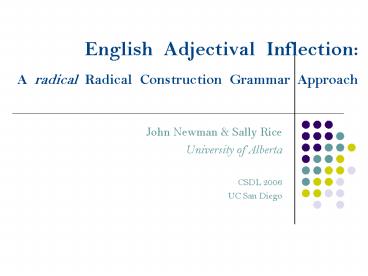English Adjectival Inflection: A radical Radical Construction Grammar Approach - PowerPoint PPT Presentation
1 / 41
Title: English Adjectival Inflection: A radical Radical Construction Grammar Approach
1
English Adjectival InflectionA radical
Radical Construction Grammar Approach
- John Newman Sally Rice
- University of Alberta
- CSDL 2006
- UC San Diego
2
Bertrand Russells Emotive Conjugations
singular
- Im tenacious
- youre stubborn
- hes pigheaded
1 2 3
3
- inflection-specific
- adjectival meaning and behavior
- in English
4
a radicalRadical Construction Grammar approach
language-specific (typologically
aware) construction-specific (context
sensitive) inflection-specific (lemma
sceptical)
5
a radicalRadical Construction Grammar approach
language-specific (typologically
aware) construction-specific (context
sensitive) inflection-specific (lemma
sceptical)
6
English Adjectival Inflection
inflectional periphrastic
suppletive positive tall interesting
good comparative taller more interesting
better superlative tallest most interesting
best
7
English Adjectival Inflection FACTORS
semantics etymology / derivation syllable
structure (Quirk Greenbaum, Kytö
Romaine 1997, Biber et al. 1999
) phonotactics register / dialect
8
English Adjectival Inflection FACTORS
semantics etymology / derivation syllable
structure (Quirk Greenbaum, Kytö
Romaine 1997, Biber et al. 1999
) phonotactics register / dialect inflectional
island effects (Rice Newman 2005)
9
Inflectional Islands
Syntactic (constructional), semantic, and
collocational properties tend to inhere in
individual inflections of a lexical item in a
register-specific manner. These properties may
not extend across all the inflections (the
paradigm) to characterize the lemma as a whole.
10
THE VERBISLAND HYPOTHESISTomasello 1992, 2004
THE INFLECTIONAL ISLAND HYPOTHESISRice Newman
2005
V lt lt lt inflection
V gt gt gt inflection
- children tend to use uninflected verb roots
before inflected forms - verb inflections are mastered on a verb-by-verb
basis - generalization is gradual
- initially, particular verbs strand inflections
- adults use particular inflected forms of
individual verbs on a register-specific basis - verb inflections adhere to verbs on a
verb-by-verb basis - particularization is gradual
- eventually, inflections strand particular verbs
11
DISTRIBUTION OF SOME BASIC VERBS IN THE BNC BASED
ON TAM INFLECTION
12
IMPLICATIONS OF USAGE-BASED APPROACHES TO GRAMMAR
a new starting point for linguistic analysis put
lemmas aside (as done earlier with syntactic rule
in favor of constructions) substitute
words-in-context or WICs (intersection of genre,
register, inflection) a new (lower) level of
linguistic generalization find the hierarchy of
lower-level structures...that specify the
actual array of subcases and specific instances
that support and give rise to the higher-level
generalization RWL, Concept, Image, Symbol,
1991281-282
13
WICs
locus of lexicalization and grammaticalization act
ive in borrowings and morphological
realignment spawn psychological associations,
induce priming effects
14
English Inflected Adjectives as WICs
uneven distribution alternate marking newer more
new double marking bestest most
commonest inflectional gaps sheer
-er sheerest inflectional idiosyncracies irregu
lar semantics collocational preferences of
WICs constructional properties of WICs
15
English Inflected Adjectives as WICs
uneven distribution alternate marking newer more
new double marking bestest most
commonest inflectional gaps sheer
-er sheerest inflectional idiosyncracies irregu
lar semantics collocational preferences of
WICs constructional properties of WICs
16
Our focus here
1. Inflectional idiosyncracies (relative
frequencies) 2. N collocates 3. A
collocates 4. Constructions
17
1. Inflectional idiosyncracies of A, Aer, Aest
18
1. Inflectional idiosyncracies of A, Aer, Aest
BEST
19
1. Inflectional idiosyncracies of A, Aer, Aest
20
1. Inflectional idiosyncracies of A, Aer, Aest
21
1. Inflectional idiosyncracies of A, Aer, Aest
22
1. Inflectional idiosyncracies of A, Aer, Aest
23
2. N collocates of A, Aer, Aest
24
2. N collocates of A, Aer, Aest
25
2. N collocates of A, Aer, Aest
26
2. N collocates of A, Aer, Aest
27
2. N collocates of A, Aer, Aest
28
2. N collocates of A, Aer, Aest
29
2. N collocates of A, Aer, Aest
30
3. A collocates of A, Aer, Aest
31
4. Misc. constructions with A, Aer, Aest
It is _____ to...
32
4. Misc. constructions with A, Aer, Aest
It is _____ to...
33
4. Misc. constructions with A, Aer, Aest
It is _____ to...
34
4. Misc. constructions with A, Aer, Aest
A-er than NORM
35
4. Misc. constructions with A, Aer, Aest
A-er than NORM
36
a radical RCG approach to English adjectival
inflection
A and A A-er and A-er more A and more
A A-est and A-est most A and most A even
A-er even more A A-er N more A N A-est
N most A N N be A-er N be more A N be
A-est N be most A
37
A radical RCG approach to allows us to leave the
paradigm behind.Paradigms (lemmas) have value
for some purposes, but they often end up
straight-jacketing an analysis.The conceit of
the paradigm tends to dull our interest in
looking at the lexical semantics of inflected
forms in their own right (cf. the Russellian
conjugations).Some items do escape the shackles
of the paradigm and actually become lexical items
in their own right.
38
- A radical RCG approach to allows us to leave the
paradigm behind. - Paradigms (lemmas) have value for some purposes,
but they often end up straight-jacketing an
analysis. - The conceit of the paradigm tends to dull our
interest in looking at the lexical semantics of
inflected forms in their own right. - Some items do escape the shackles of the paradigm
and actually become lexical items in their own
right (cf. the Russellian conjugations).
39
a radical RCG approach to English adjectival
inflection
rath(e) rather rathest
nigh near next nearest
forme former first foremost
late later last latest
40
a radical RCG approach to English adjectival
inflection
rath(e) rather rathest
nigh near next nearest
forme former first foremost
late later last latest
41
Thank you.































